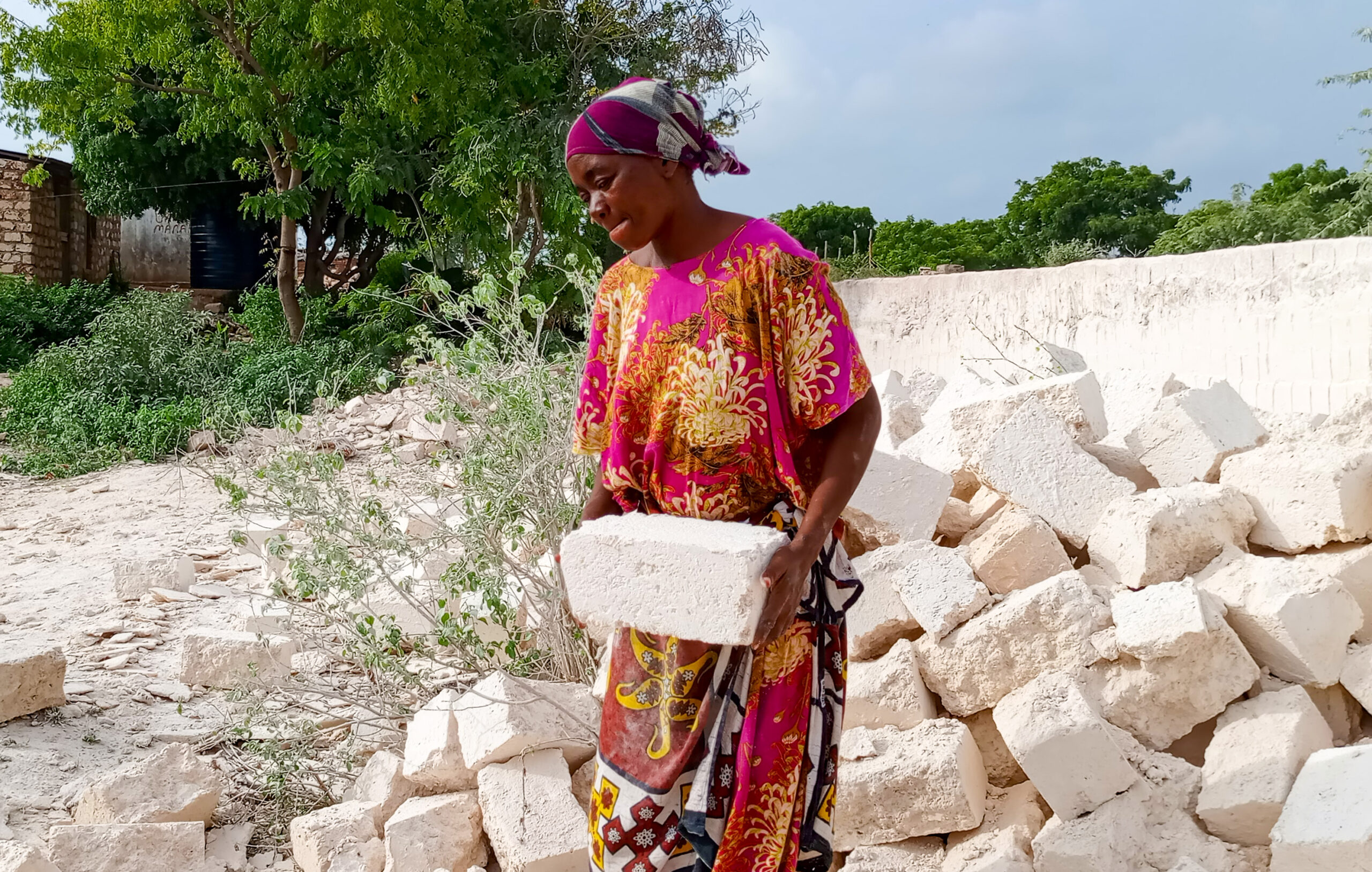On the Kenyan Coast, a group of women are redefining roles in the construction industry. Among them is a skilled stone cutter who transforms raw materials into building bricks.
By Velma Pamela
Almost everywhere she looks, as she goes about her business in her community in Kenya’s coastal Kilifi County, Saumu Mohamed can see the fruit of her labour.
Throughout her community and well beyond it are homes, churches, schools, and multimillion-dollar buildings that have all been built with stone blocks cut from the coral rock that abounds throughout the region by Mohamed, her family members, and her team.
Those stone blocks — each carefully cut and shaped — form the foundation and walls of countless buildings that have contributed to the growth and transformation of the region.
“I love what I do,” she declared with a smile. “It’s really satisfying to go about and see the advancements made with the stones we cut. Kilifi is surrounded by people who are constantly building, and what keeps me going is knowing that we have contributed to that progress.”
Mohamed and her family work on weekends, taking advantage of the extra help her children provide when they return home from university over the holidays. With their help, she can cut 600 to 1,000 stones in a single day.
Mohamed’s business is a booming operation that specialises in stone cutting and supply for a variety of construction projects. She is the sole owner, having started the company with hard work and tenacity.
What began as a small enterprise has developed into a well-known name in the industry, supplying high-quality, precisely cut bricks to builders throughout her town. Mohamed employs staff, cultivating an efficient and collaborative atmosphere in which men and women coexist.
Her business not only provides a consistent supply of necessary supplies, but it also creates employment for both skilled and unskilled labourers, ranging from brickmakers and transport workers to site assistants, encouraging more women to pursue roles in the construction industry.
Mohamed’s journey began more than three decades ago when she relocated to Magorani in 1996. Magorani is a stone-cutting powerhouse, with the terrain providing the raw materials that define Kilifi’s skyline.
Nestled in the heart of Kilifi County, on the coast of Kenya, this rocky region is recognised for its huge reserves of coral limestone, a valuable construction material.
Back then, it was a dense forest area with little activity like subsistence farming and occasional charcoal burning. Women in construction were virtually unknown, and stone cutting was a tough, male-dominated job that required nothing but hammers, axes, and pure physical power.
Challenging local gender norms, Mohamed started working with the men, learning how to use tools and hit rocks. Traditionally, workers broke up the stone with crude hand tools such as hammers and axes.
The hammer produced force, while the axe (a chisel-like implement in this example) assisted in creating fissures and cutting through the rock. However, this approach had significant drawbacks: it required a lot of physical effort, was time-consuming, and frequently produced uneven or fractured stones.
By 2021, hand grinders had replaced these conventional instruments, delivering a considerable improvement to the trade.
“We switched to the grinder instead of the hammer and axe,” Mohamed recalled. “The majority of us were unable to operate the grinder, which was the main issue. This meant we had to help the men running the machinery a lot rather than doing it ourselves.”
A grinder is a power instrument with a fast-spinning, circular blade that can cut through stone more precisely and efficiently than a hammer and axe. Instead of repeatedly striking the stone, workers may now utilise a machine to make clean, smooth cuts in a fraction of the time.
While this increased productivity, it also presented new issues, such as securely operating the powerful tool and dealing with the fine dust produced during cutting.
Determined to become experts, Mohamed and the other ladies started attending training classes every day to learn how to operate the grinder. The training, conducted by men who already had the technical skills, took place throughout 2021 and 2022.
Their patience paid off, along with honing her skills. Mohamed made an investment in her own tools, spending 40,000 Kenyan shillings on two grinders.
Today, she works as a site operator, challenging gender norms and inverting traditional roles by recruiting men as assistants.
She is also a member of the women’s aid organisation known as Magorani Women in Brick Cutting. This group enables them to save a portion of their wages and use the money to enhance their lives and those of their families.
Mohamed’s stone cutting is more than just a source of revenue; it is also an effort to uplift her society. Her efforts have transformed raw materials into sturdy blocks that will house future generations, setting the framework for the spectacular structures that grace the area.

According to Lloyd Kai, a civil engineer and contractor in Kilifi County, women play an important part in shaping the local architectural landscape.
Kai, who has worked on a number of structures in Kilifi, notably the Imarika Plaza in Kilifi Town, has observed the increasing participation of women in the business.
“If you visit a construction site to buy stones today, you’ll be amazed at how many women are actively involved in the work. Today we have sites solely owned by women which was not the case in 2020,” he said. “In addition to the money, they are motivated by the knowledge that they can provide for their families just as well as men do, and they like seeing the end product,” he concluded.
Another local stone-cutting business owner, Isa Mohammed, emphasises the importance of women in the industry.
“Years ago, women were excluded from stone cutting because society did not expect them to undertake it. On a normal day, you could end up not seeing any woman in the field. However, the situation has since changed. Today, every stone cutting site has at least two women, and some exclusively deal with women only. More and more women are standing up, demonstrating that they can use the tools just as well as anyone else,” Mohammed said.
The introduction of grinders and other sophisticated equipment has made the job much easier—it is no longer only about strength. And, with more training available and attitudes improving, women are stepping in and proving they belong.
Mohamed proudly stated, “Opportunities like this have significantly decreased the rate of crime and idleness in Magorani.”
Her business, which employs five young men to help with operations, is a vital part of her village’s economy.
She emphasised that “both men and women can do this work. It shouldn’t frighten women. We are just as strong, driven, and capable of succeeding as men.”
Mohamed’s path from the isolated Magorani to running a successful stone-cutting company is an example of creativity and persistence. In order to leave a legacy that honours her perseverance and hard work, she hopes to build buildings in other cities in addition to her neighbourhood in the future.
At 6 a.m. in the sun-soaked countryside of Kilifi County, Saumu Mohamed begins her day. Standing behind a pile of stones, machine in hand, she carefully checks her tools as she gets ready for the rhythmic sound of the grinder to echo throughout the village.
bird story agency
In Kilifi County on the Kenyan coast, women are reshaping the construction industry, led by Saumu Mohamed, a skilled stone cutter and business owner. Mohamed's company supplies precisely cut stone bricks for construction, contributing to local infrastructure while providing jobs for both men and women. Starting over three decades ago, Mohamed challenged gender norms in a male-dominated field by initially using hammers and axes, transitioning to modern grinders for efficiency. Her determination and training have enabled her to operate advanced tools and cultivate a successful business, comprising young male assistants and supporting her community economically.
The introduction of grinders has transformed stone cutting, reducing the physical demands and encouraging women's participation, with many now leading or co-owning construction sites. Local contractors, such as civil engineer Lloyd Kai and business owner Isa Mohammed, acknowledge women's crucial contributions to Kilifi's architectural landscape. This shift not only empowers women financially but also curbs crime and idleness in their communities. Mohamed's journey embodies innovation and resilience, as she aims to expand her influence beyond her locality, promoting gender equality and economic growth in the construction field.






